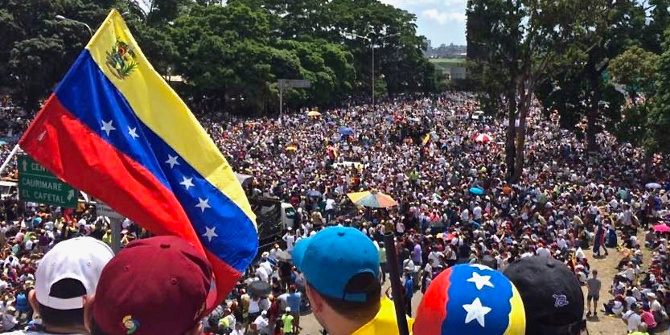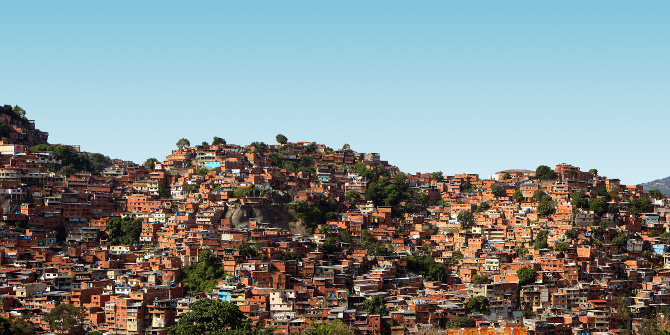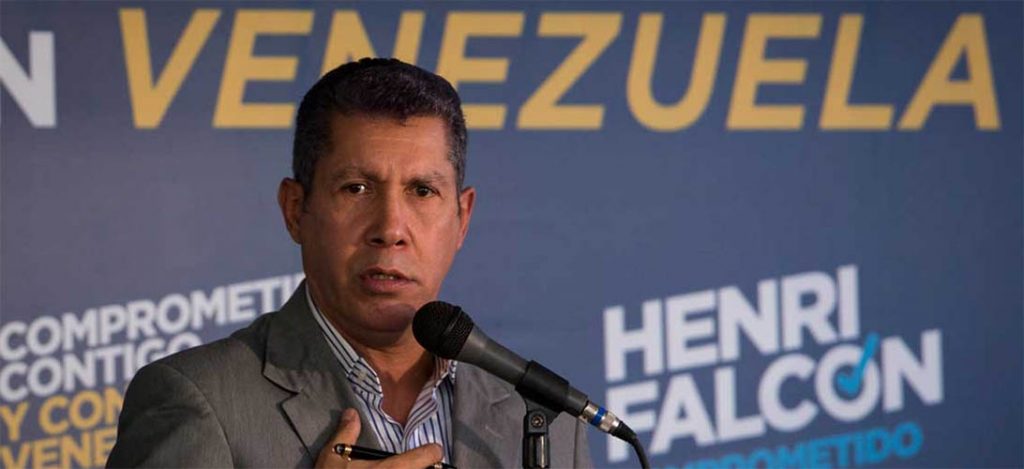The only thing keeping Venezuela’s Maduro in power is the opposition
Republished courtesy of Al Jazeera.
If Venezuela’s opposition really wants to remove Nicolas Maduro, it must unite behind renegade candidate Henri Falcon.
Can anyone win in an illegitimate election? This is the big question in Venezuela today, as commentators and citizens alike debate whether to participate or abstain in upcoming elections, where one candidate, Henri Falcon, has defied the opposition coalition’s decision not to take part.
In short, the answer is “yes”. Paradoxically, the very lack of legitimacy that undermines these elections has also created the conditions for a viable candidate to garner broad support and unseat Nicolas Maduro. But for that to happen, the opposition Democratic Unity Roundtable (MUD) must back Falcon, and begin to convince a desperate and disillusioned electorate that voting can make a real difference.

The most obvious reason why an opposition candidate can win is that, according to one of Venezuela’s most reliable pollsters, around 75 percent of those eligible to vote would be willing to vote against Maduro. Or to put it another way, “never, ever in the history of Chavismo over the last 20 years, has it been so clear that people want real change”.
Sadly, the complexity of this picture tends to be obscured by infantile narratives of opposition good guys versus government bad guys, where in reality the largest political group in Venezuela is the 51 percent supporting neither. Essentially, since the death of Chavez, most Venezuelans have been voting for the side they deemed to be the lesser of the two evils, but the cynicism and incompetence of both sides has gradually worn down even this minimal enthusiasm.
Support for Maduro has been ravaged by devastating economic, political, and social deterioration. Runaway inflation has eroded purchasing power and instilled a sense of intractable economic chaos. A dysfunctional currency regime has destroyed local industry, enabled massive corruption, and – combined with declining prices and production of oil – provoked serious scarcities of vital food and medicines. The resulting social hardship has fuelled unrest and emigration, but the conventional political channels for change have been blocked by anti-democratic means.
As for the opposition, no amount of hagiographic foreign journalism can erase what most Venezuelans already know:
- The MUD’s leaders are overwhelmingly drawn from the richer, whiter side of society and have never shown any sign of understanding or caring about the poorer, darker majority in the way that Chavez did.
- These leaders themselves have been all too willing to support anti-democratic measures, not least the 2002 coup and subsequent oil strike.
- Despite having nearly two decades in opposition to shape a coherent platform for government, they have never advanced beyond their one unifying goal of removing the incumbent.
As veteran pollster and analyst Luis Vicente Leon has noted, this opposition acts with all the self-obsessed short-sightedness of a teenager, and its leaders and parties inspire neither support nor sympathy.
Henri Falcon: traitor, Trojan horse, or potential president?
The key reason behind the MUD coalition’s decision not to participate in the upcoming elections was that two of its figureheads, Leopoldo Lopez and Henrique Capriles, are barred from running. Even without considering wider democratic failings, they are quite right to claim that this one fact makes the elections illegitimate. They are, however, quite wrong to think that the participation of one systematically disadvantaged candidate could lessen this illegitimacy, which is abundantly clear both at home and abroad.

Moreover, rather than being a traitor for deciding to run – or worse a Trojan horse for Chavismo – Falcon’s middle-ground status could prove more appealing than the usual MUD candidates to Venezuela’s unrepresented majority of disaffected “neither/nor” voters and disgruntled Chavistas.
Though opposition and government alike could depict him as a turncoat, this varied background means that he knows both sides of Venezuela’s stark political divide, has experience of public administration, and has already come close to engineering an opposition victory in far less favourable conditions (following Hugo Chavez’s death).
Since launching his campaign he has also made clear commitments that speak to public concerns: to tackle inflation through dollarisation, to reduce the potential for corruption by serving a single term, and to promote a peaceful transition both by releasing political prisoners and by disavowing persecution of Chavista officials. This moderate approach is strategic and pragmatic rather than moral or ideological, which is precisely what is required in a context of entrenched polarisation where the candidate could pick up support from all sides given the overwhelming unpopularity of his opponent.
Even without MUD backing, Falcon already leads Maduro by 16 points in head-to-head polling.
Hope, help, and turnout
But the real danger to Falcon’s bid – and the main reason that he needs MUD support – is that this election will be decided by turnout rather than voter preferences.
As it stands, only 41 percent of voters are “very willing” to vote – a figure usually around 70 percent at this stage – whereas a further 20 percent are “very unwilling”. Within the hard core of definite voters, Chavistas are significantly over-represented, whereas those determined not to vote are almost entirely opposition supporters.
If this situation prevails on election day – even more so if the opposition calls for a boycott – staunch Chavista voters will show up in the greatest numbers and return Maduro to the presidency with a low turnout. If, however, the opposition were to back Falcon or simply participation, a relatively modest 54 percent turnout could produce a Falcon victory.
MUD backing would also have an important effect on momentum and hope, particularly with election day over two months away. Though the MUD is far from representative of the entire opposition, its stance sets the tone for critical media that are far freer and more influential than commonly believed. And in Venezuela, this hope is more than a warm fuzzy feeling, as it can serve to assure Maduro voters direly dependent on the benefits of political patronage that supporting an alternative candidate represents a risk worth taking.
MUD backing is also crucial in terms of the final barrier to popular hope and participation: fear of electoral fraud. One of Falcon’s conditions for running was that the process would follow the same standards as 2012 and 2015 elections, with every step open to international observers. While the UN may not be able to send a full mission at such short notice, nor without a Security Council or General Assembly mandate, the key task of scrutinising storage and transfer protocols in Venezuela’s electronic system could be performed by a more specialised, lower-level mission. Paper copies deposited in ballot boxes for auditing of the electronic vote, meanwhile, could then be monitored by national observers. Again, the MUD has far more experience and manpower apt for this task than the smaller coalition behind Henri Falcon.
And if Falcon wins?
So, can anyone win in Venezuela’s illegitimate 2018 presidential election? The only answer is “yes”, but the possible gains depend on turnout, which in turn depends on whether the MUD calls for a boycott, participation, or support for Falcon.
While abstention offers nothing more than another round of violent and violently repressed street protests, devoid of any wider strategy, participation offers the chance for an unusually moderate, big-tent candidate to take the presidency, yet without whitewashing an election that is unquestionably illegitimate.
The greater the participation, the more likely such a victory becomes and the harder for the government to deny it. Maduro would either have to accept the result and give up power or force electoral authorities to commit out-and-out fraud of a kind not previously seen in Venezuela, thereby robbing his government of what little legitimacy remains.
Maduro’s incompetence and Falcon’s defiance have given the MUD leadership a better opportunity to defeat Chavismo than they ever managed to craft on their own. Now it’s up to them to take it.


